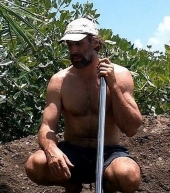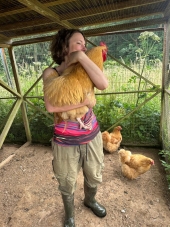
 1
1




How permies.com works
What is a Mother Tree ?
 2
2




 4
4




Check out my newest project at http://www.stadtfarm.com http://www.twitter.com/stadtfarms or https://www.facebook.com/StadtFarm/
 3
3




"Be the change you wish to see in the world"
 3
3




Permaculture Without Animals?
Not all permaculturists or permaculture projects are vegan, and I’ve often been asked whether a completely animal-free permaculture is even actually possible. My response is, of course not, and neither would it be desirable. For example, how would we fence out the earthworms that build our soil and maintain its fertility, or the bees that pollinate our fruit trees and vegetables, and why ever would we wish to? In fact, we actively design in features that are intended to attract wildlife: Ponds for frogs, toads and dragonflies, and flowering plants to bring in the ladybirds and hoverflies that keep populations of potential pests like slugs and aphids in check, and are essential to maintaining healthy productive ecosystems. What we don’t include are those ‘system components’ that we believe perpetuate exploitative relationships with our non-human earth co-citizens, such as pigs, goats and chickens, whose primary function is the production of meat, milk and eggs.
The Naturewise forest garden in north London is one example of an edible landscape that is ostensibly ‘stock free’, although in actuality members of several of the Kingdoms of Nature work together here for mutual benefit. Deep rooted comfrey plants mine nutrients like nitrogen, potassium and phosphorous from the subsoil, making them available to fruit trees and bushes. Birds and bees buzz around the canopy layer, whilst insects and arthropods patrol the undergrowth and leaf litter, checking and balancing pest populations and playing their role in the cycles of growth and decay. Fungi and bacteria continue the process. These break down dead matter into rich humus and minerals that are exchanged with plant roots via associations with mycorrhizal soil networks in return for sugars and carbohydrates manufactured by photosynthesis. Based on the structure of natural woodland, the forest garden is a complex web of which humans too are an integral part. Aside from a bounty of apples, pears, figs, grapes, strawberries, currants and edible leaves, one of the most important yields of this mini-woodland is the sense of community that the space offers to the volunteers that spend time here. And being situated in a school playground it also acts as an open air classroom where children of many ethnic and cultural backgrounds are able to interact with nature, an opportunity that is often all too rare in the inner city.
 3
3




 1
1




Check out my newest project at http://www.stadtfarm.com http://www.twitter.com/stadtfarms or https://www.facebook.com/StadtFarm/
 1
1




 2
2




Little house with a big garden in the city!
"It is no measure of health to be well adjusted to a profoundly sick society." ~ J. Krishnamurti
 5
5




Burra Maluca wrote:With diet, it's B12. What things do vegan permaculturists have to take extra care with or do differently when designing their systems?
 1
1




Mark Wyborny wrote:
I would say Nothing is really done differently at all.Except we don't shoot the animals that come around.
I eat only plants and fungi and am 59. I get B12 the same way all primates and other animals do. From soil bacteria that produce it for plants and fungi to absorb. I grow without artificial fertilizers because those do not contain any B12 at all! There is nothing different about my diet and B12. Mushrooms, kombucha ,all organic plants have all the B12 all normal healthy animals need. There are some people who cannot absorb B12. They are most often meat eaters who take the shots and who have destroyed their systems. They must take b12 shots because even being a scavenger doesnt provide B12. I take nothing but plant /fungi also occasionally seaweed algae food and am 200 # 6 feet 3 inches.
I don't kill animals that eat my crops. I use fence , plant cages and aluminum pie tins hanging from strings. I have a red nose pit bull that is my most valuable asset. He chases away things that I tell him to. I feed him all the eggs his chickens lay but the ones they decide to hatch. People give me unwanted animals. I love animals. I cannot refuse if I can help.
I use the manure from my animals.I have percheron horses and goats and chickens. Ive had just about every animal. I keep honeybees to pollinate my crops and I eat the pollen for B12 and protein and I use the honey. Unlike others i think eating bee milk royal jelly and bee brood is not appetizing to me though.
The only thing I do differently is I don't kill actual animals ever. I just kill ticks fleas parasitic nematodes flies and bad bugs.
I just don't eat animals or enslave them. I try to give them all freedom and protection and equal respect.

 3
3




Aaron Neville wrote:1. Does vegan permaculture utilize animals without eating them?
2. Does [vegan permaculture] it seek to absolutely exclude animals?
3. Can vegans have pets?
4. What would a vegan have us do with the eggs?
5. Is the vegan perspective simply not to have chickens as pets?
6. Would vegans consider this cruelty to the animals being eaten [by chickens]? Or, how do vegans feel about wild animals eating other wild animals?
7. Is there a place for chickens in Vegan Permaculture?
8. What is the vegan stance on keeping a culture of worms, Black Soldier Fly Larva, woodlice, or other such decomposers and detrivores?
9. If I'm raising fish I don't intend to eat (for example, exotic, tropical or ornamental fish) but cycle their nutrient-rich water through a vegetable garden bed to eliminate water waste and feed plants, would vegans disapprove?
10. But if animal components provide higher levels of fertility, why not utilize them? What do vegans suggest be done with animal manures if not compost them?
11. Can the manures of herbivores be used in compost? Geese manure is okay but duck manure is not?
12. What is the vegan perspective on beekeeping? Don't harm the bees, don't eat the honey? Don't keep bees, just let wild bees do their work?





| I agree. Here's the link: http://stoves2.com |








